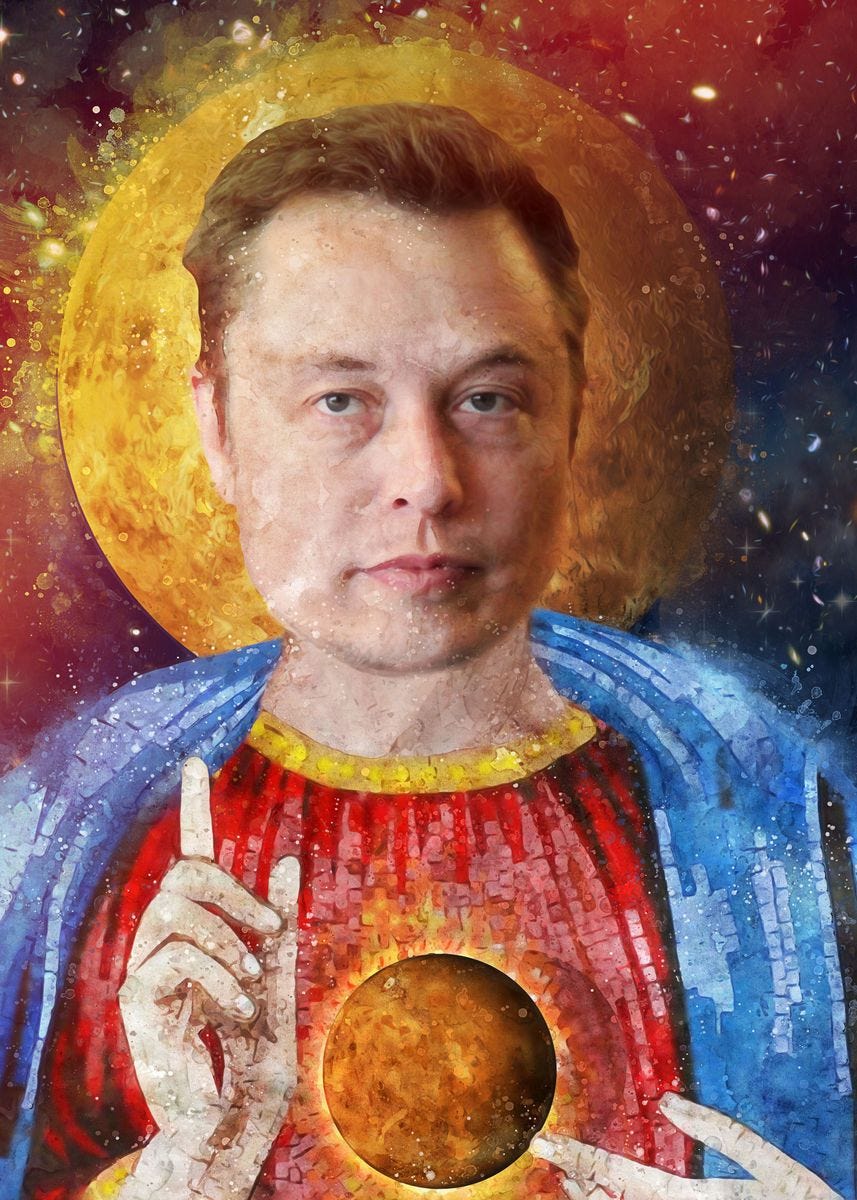Elon Musk is why we need new stories
The messiah-shaped hole at the heart of Western culture, and how to fill it
Like a stoned philosophy undergraduate, I often find myself thinking and writing about “the problem with the West” without ever really defining that term.
What does it mean?
Clearly, it doesn’t mean strictly the western hemisphere. I think the closest I’ve come to understanding what I or anyone else means by “the West” is (for better or worse): the countries that once formed Christendom. (Paul Kingsnorth has written a lot about this idea in the last few years, over at his Substack The Abbey of Misrule, if you want to read further.)
Meaning: the culture we live in was originally formed around a radical faith, a living set of principles, and the teachings of a messiah.
When you look at it this way, it’s not so hard to see why we keep falling for charismatic sociopaths. As the lifeblood of the Christian faith has drained away, we’ve been left with nothing but a too-easily-coopted structure of power and a messiah-shaped vacuum. (For my money, this hollowing was written into the DNA of Christianity as exported by the Roman Empire, which had already turned it into a tool of patriarchy and power-over—but I guess that’s by the by, at this point.)
It was never meant to be this way. The messiah is not supposed to live in a gold-plated apartment in Manhattan or plot to colonize Mars. The messiah is made flesh to enact the will of God. And whatever your feelings about God, we can probably agree that his or her motivations and story engines are more interesting and expansive than the monomaniac pursuit of power and wealth that seems to possess the messianic psychos of our day.
So what do we do about the Elon Musks of this world? How do we escape the destructive and incredibly boring storylines they keep spinning? These are among the big questions of the moment.
Some people are seeking a solution in revitalizing the Christian faith, returning to worship of the original messiah of these lands so that we stop falling for false idols.
Personally, I think the messiah structure might itself be the problem. I don’t know that humans will ever escape the tendency to pollute the power concentrated in such a role.
I’ve been looking for more humble models of heroism, and have found them in surprising places—like the 12-step program. The program was, of course, originally rooted in the Christian faith. But certain modifications required to keep addicts alive have, I believe, safeguarded it against being coopted or corrupted in the way of other faith-based institutions.
At the program’s core is an emphasis on accepting reality and having the courage to sit in its grit. The serenity prayer that’s at the heart of the fellowship says: “Grant me the serenity to accept the things I cannot change, the courage to change the things I can, and the wisdom to know the difference.”
For addicts, these aren’t just pretty words. They’re a matter of life and death—because the moment you start resisting the things you cannot change, trying to escape or control them, you’re liable to land back in the grip of the addiction that nearly killed you.
What’s this got to do with heroism? Well, it means you have to accept your mortality. Your humanity. Your suffering. It keeps you humble and human, which means that the actions you do take are on a humble, human scale—and all the more meaningful for it.
Of course, as a writer, I’m aware that a story setup like this rarely seems as satisfying as the messianic arc. The hero’s journey is in the bones of Western culture, right along with the Bible. In fact, it’s embedded in the Bible, in many ways.
But is it the only story we can tell?
I thinking finding a new story might start with looking for a different texture of satisfaction in our daily lives. Start choosing the unglorious, sometimes painful, perhaps culturally counterintuitive, but right thing to do in a given situation. Win your own self-respect through a quiet accumulation of estimable acts, and start secretly being a new, humble kind of hero of your own story. And see where that takes you. I suspect the story might be more beautiful and satisfying than any of us could ever imagine—and certainly more than any unhinged narrative Elon Musk is likely to model.



why not, why should the 'messiah not plot to colonize Mars'?!
The one Great Magician turned water into wine..... and hydrogen into all this, and nothing into something......
That we worship Elon is our issue, that he plots as he does...... well, that is not what is destroying the wonder world.... The Wonder World is on a journey too, and it was careening way off the rails when Elon came along....
How to bring it back to a place where a human future is possible....? As Thomas Berry wrote some years ago, "The task of the our time is to reinvent the human on the species level."....
I agree that it's in the small things ... 'a quiet accumulation of estimable acts, and start secretly being a new, humble kind of hero of your own story.'
This, I love.
I read recently the phrase 'embody grace' - now that is a way to fill a messiah shaped hole. Imagine what the world might be is this was our obsession. 💚